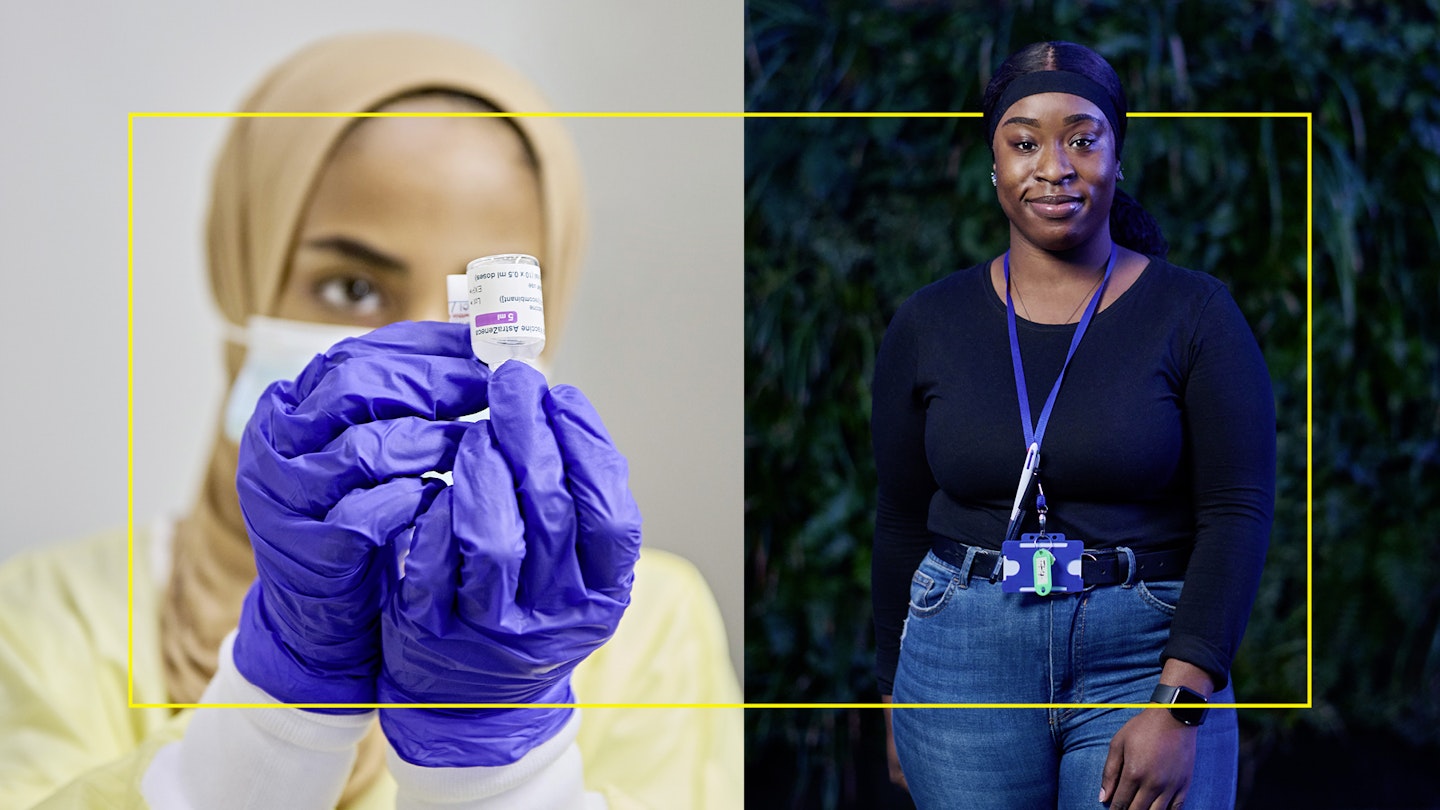At the Excel Centre in London the shutters are down on many of the cafés. No one is queuing for careers fairs or conferences. The huge space feels like a half-empty shopping mall. But what’s happening here will be immortalised in the history books.
At the far end of one of the large hangars is a row of fridges storing hundreds of doses of the Oxford/AstraZeneca Covid-19 vaccine, which, unlike the Pfizer-BioNTech vaccine – also approved for use in the UK – does not have to be stored at extremely low temperatures, making it easier to distribute.
Each vial of liquid represents our ticket to freedom; lives saved, lives resumed. It explains the buzz of excitement in the air. At the other end of the hangar, volunteers push elderly people in wheelchairs, chaperoning them around the strict one- way system as dozens wait to receive a jab that will mean they can soon see their loved ones, in person, after 11 months at home.
Havza Husein, 22, a fourth-year medical student, applied to administer the vaccine through the NHS agency Bank Partners while her university is closed. Her 12-hour shifts start at 8am. This is her first week at the ExCel, vaccinating people in their eighties and nineties, frontline workers and carers. ‘Everyone has been so excited and grateful. Sometimes, I’m the first person they’ve seen for months. They are quite lonely and see this as the end of their loneliness,’ she says. ‘Some have said, “I can finally see my grandchild not through a window.” You’d imagine to only have small talk, but the bond feels so genuine because it’s this huge moment.’
Havza, who has had the vaccine and wears PPE, has been vaccinating around 50 people a day and is yet to see a single person react badly to the jab.
‘Yesterday, I met an elderly lady with dementia who lost her husband to Covid in March. Her son told me that her dementia had worsened since his dad died. Before this, she used to speak. Now she doesn’t speak at all,’ she says. ‘The son was so grateful to see his mum get the vaccine, he’d been so worried about her. Another elderly woman told me she survived the war but that this has been harder, because this time we can’t see the threat. Doing this makes me feel like I’m doing my bit. It’s the first step to getting us back to normality.’
Those waiting for the jab are checked in and queue to go into one of the three pods in action, each with six vaccination rooms inside. Around a third of the staff are volunteers. At the moment, they’re getting through about 1,500 people a day. They have capacity to do over 10,000 jabs a day (if they opened all 21 pods).
‘We’ve started smaller but we’re looking to scale up,’ says Jan Flint, managing director of the ExCel vaccination centre. ‘It’s dependent on staff, vaccine availability and other tech to go with it. The ambition is that we’ll be up to that capacity by March.’
Jan says they didn’t expect to see large numbers of over-eighties coming to the ExCel. ‘We thought they’d prefer to go to their GP. But I think we had someone who was 103,’ she says. ‘I had a lovely couple who were 94 and 86, and she hadn’t received the letter [inviting her to the centre for a jab], but he had. We vaccinated her the same day and she was delighted. It’s humbling to see what it means to people. We’ve had people in tears and people taking pictures of their relatives having it done,’ she adds.
Abigail Atakora, 30, is working as a vaccinator – also through Bank Partners. She trained to give the jab at the Royal London Hospital in December because she wants to give back after the NHS saved her life. ‘A few years ago, I almost died in a stampede in a nightclub,’ she says. ‘What I went through was so traumatic and life- changing I’ve been trying to work out my purpose since then. The NHS saved my life; now I want to do what I can to help people.’
Abigail says she sees so much joy at the vaccine centre. ‘It’s like gold or diamonds to people. Sometimes, I can give the vaccine to a carer who has brought in an elderly person and they don’t expect it at all. It’s amazing seeing how happy it makes them.’
Louise Rabbitte, 50, a nurse, is one such frontline worker who didn’t know she would be getting her vaccine until she was offered a slot last week. ‘I feel incredibly lucky and privileged to be in one of the first groups,’ she says.
Jan says she went home on her first day last week and cried. ‘The significance of being involved in a programme like this really hit me. It’s something we’ve never seen in our lifetime,’ she adds. ‘I’ve worked in the NHS since 2001 and this has been the best week of my career. We’ve got hope for a brighter future.’
To volunteer to help the vaccine roll-out visit england.nhs.uk/coronavirus/join-the-nhs- covid-19-vaccine-team.
Photography: Amit Lennon
